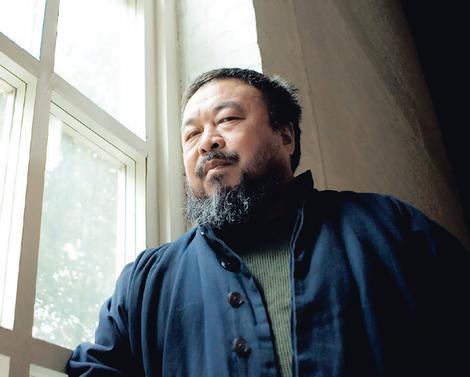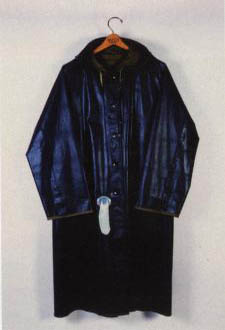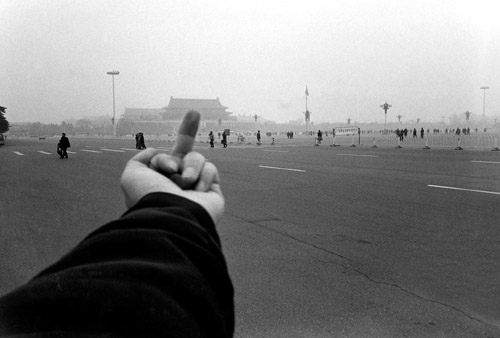
It's grand to be Ai Weiwei. The true businessman lives for the deal; money is only a way of keeping score. The true artist, more than anything else, wants to be taken seriously, for his work and ideas to move people. From the very beginning, Ai Weiwei's career has prospered by the gold standard of non-posthumous impact, his government. More than three decades on, no living artist draws more official scrutiny.
Successful western artists must be jealous. Their money and fawning society matrons surely please, but even a picture of a crucifix in a bucket of urine inspires at best a salvo of protest, and that from the piffling religious right. An amateur's picture of Obama with a Hitler mustache draws more media attention; the western artist is stifled by his very freedom.

Meanwhile, Ai Weiwei rests in a Munich hospital from an operation on a cerebral hemorrhage, which may or may not have resulted from a beating at the hands of Sichuan police last month. Lesser artists would suffer greater pains for the results: deafening silence in the Chinese press, and international trumpeting of Ai and his song: greater democracy for China.
Not for nothing did warlords of old kill their enemies and then their enemies' sons. Little else focuses a young and vital soul like a revenge quest. Ai Weiwei's father, renowned poet Ai Qing, was sent with his wife and one-year-old to scrub toilets in a desert labor camp during the Cultural Revolution. Ai still remembers other children throwing rocks, their parents pouring ink on his head. By the time he was twenty, Ai Weiwei himself was stone-slinging a still implacable communist regime with his avant-garde Stars, the first Chinese artists to openly spurn mandated social realism.
Never imprisoned for his involvement , Ai nonetheless felt endangered enough to escape to the United States in 1981, arriving in New York with less than a hundred dollars in hand. Swimming in the nihilistic vortex of Andy Warhol and Jasper Johns, he learned that real art has nothing to do with product, and everything to do with lifestyle (and self-promotion). From then on, Ai Weiwei would choose starvation over making something that looks nice in your living room. His work would be strictly conceptual, repurposing of found objects, a raincoat with a condom glued to it, forty-two bicycles stacked up in a circle, a photo of him dropping and smashing a Ming vase.
Fame would come much sooner than money, which suited Ai Weiwei just fine. He didn't even really begin to sell until 2004, but a turn-of- the-millennium gig had already guaranteed his career, curating F-k Off, an exhibition of forty six avant-garde Chinese artists, including him. Held alongside the Third Shanghai Biennale, F-k Off gave the event a bitter dose of its stated intent: an honest survey of contemporary art. Photos of Ai Weiwei flipping the White House, the Forbidden City, and viewers the bird no doubt made for much disconcerted head-scratching. Cohort Zhu Yu and his photo series "Eating People", in which the artist cooks and eats a human fetus, was an international emetic, leading to investigations by the FBI and Scotland Yard, and the kind of priceless press that many of the participants are still coasting on.

His next coup was consultation, perhaps inspiration, for the Bird's Nest stadium with Herzog & de Meuron. His high-profile participation in the Beijing Olympics made a sensational backdrop for his eventual disillusionment with the games and final disowning of the whole project. Ai Weiwei now had a platform for much more tangible protest, fleshed out in stunts such as holding an auction for a bag of tainted milk powder.
His current stay in a Munich Hospital is the latest episode in the ongoing drama of his investigation of students who died in the 2008 Sichuan earthquake. For all that his reputation rests on his portrait of China's government as an iron-clawed dragon, Ai lives comfortably on the outskirts of Beijing, where an unending stream of reporters, devotees, and well-wishers must compete for parking space with the not-so-under cover policemen who watch him round the clock. No abstruse aesthetic prattle coming out of this artist; his medium nowadays is chiefly words. We'll leave you with some of his most recent, and most poignant.
I want to spend all my time on politics now. However if they stop me it will be difficult, so I need to come up with some ideas, or do art in a different way. Exhibiting art in museums isn't very interesting... Art is connected to our lives. Our lives are political so it becomes political.
I would very much like to give some advice to Obama. He represents the promise of a new era. He brings the promise of a new era in which we don't treat human beings as a commodity to be traded...
"Letting some people get rich first" what kind of statement is that? They have no ideals. They're pragmatically saying well we don't want to end up like North Korea with people starving so we'd better let some people get rich first. Go out and do whatever you want, be a prostitute, a security guard, whatever, as long as you bring home money.
Ernie's blog
Warning’╝ÜThe use of any news and articles published on eChinacities.com without written permission from eChinacities.com constitutes copyright infringement, and legal action can be taken.
All comments are subject to moderation by eChinacities.com staff. Because we wish to encourage healthy and productive dialogue we ask that all comments remain polite, free of profanity or name calling, and relevant to the original post and subsequent discussion. Comments will not be deleted because of the viewpoints they express, only if the mode of expression itself is inappropriate.
Please login to add a comment. Click here to login immediately.